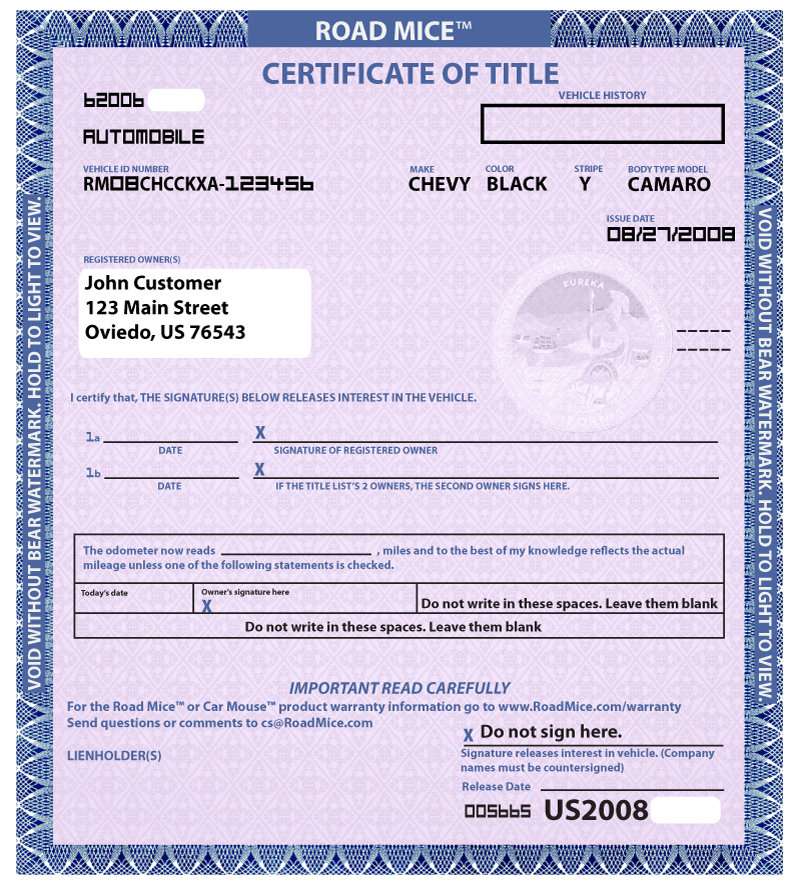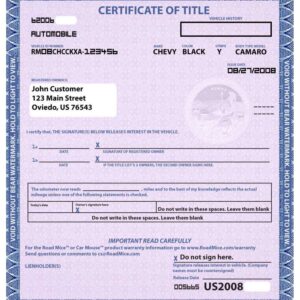Bill of sale vs title for car
Bill of Sale vs Title for Car: Key Differences Every Vehicle Owner Must Know

When purchasing or selling a car, two critical documents come into play: the bill of sale and the title. These documents serve unique but equally important legal functions in the vehicle transaction process. Understanding the difference between a bill of sale and a title for a car is essential to avoid ownership issues, registration delays, or legal disputes.
This guide outlines every detail you need to know about these documents, their functions, when they are required, and how they interact with each other in a car transaction.
What Is a Car Title?
A car title is a legal certificate of ownership issued by the state’s Department of Motor Vehicles (DMV) or relevant transportation authority. It officially documents who owns the vehicle, and it often includes critical information such as:
-
Vehicle Identification Number (VIN)
-
Make, model, and year
-
Owner’s name and address
-
Lienholder information (if financed)
-
Odometer reading at the time of transfer
-
Title status (e.g., clean, salvage, rebuilt)
The title must be transferred to the new owner when a vehicle is sold. Without a properly endorsed title, the new owner cannot register the vehicle or claim legal ownership.

What Is a Bill of Sale for a Car?
A bill of sale is a written agreement between the buyer and seller that outlines the details of the car transaction. It is a proof of purchase rather than a legal ownership document. While it does not establish ownership like the title does, it is still a vital record for both parties involved.
A comprehensive bill of sale usually includes:
-
Full names and addresses of buyer and seller
-
Date of sale
-
Description of the vehicle (VIN, make, model, year)
-
Sale price
-
Odometer reading
-
Disclosures (e.g., “as-is” condition, no warranty)
-
Signatures of both parties
In many states, a bill of sale is required to register the vehicle or to complete the title transfer process. Even in states where it’s not mandatory, it provides legal protection and serves as a receipt of the transaction.
Key Differences Between a Bill of Sale and a Title
| Feature | Bill of Sale | Title |
|---|---|---|
| Function | Proof of transaction | Proof of ownership |
| Issuer | Created by buyer and seller | Issued by the DMV/state |
| Legal Ownership? | No | Yes |
| Required for Registration? | In some states | Yes, always |
| Contains VIN? | Yes | Yes |
| Includes Price? | Yes | No |
| Transferable? | Yes (copy) | Yes (requires official DMV process) |
| Used in Court? | Can support proof of sale | Used to prove ownership rights |
Can You Use a Bill of Sale to Prove Ownership?
No. A bill of sale alone does not grant ownership rights. It proves that a transaction occurred, but it does not replace the title. To legally own a vehicle, your name must be listed on the vehicle title issued by the DMV.
However, if there is a dispute about the sale, a bill of sale can be used in court to verify that a purchase occurred, under the terms agreed upon by both parties.
What Happens if You Have a Bill of Sale but No Title?
If you’ve bought a car and only received a bill of sale without the title, you may face significant registration and ownership issues.
Here’s what to do:
1. Contact the Seller
Ask the seller to provide the original title. It must be signed over to you. If the title was lost, they must apply for a duplicate with their state DMV and then sign it over.
2. Verify State Laws
Some states allow you to apply for a bonded title if the original title is unavailable. You will typically need:
-
Bill of sale
-
VIN inspection
-
Proof of attempts to contact seller
-
Surety bond
3. File a Complaint (If Needed)
If the seller refuses to cooperate, you may need to pursue legal action or file a complaint with your local authorities or DMV fraud division.

Is a Bill of Sale Always Required?
While not universally required, many states mandate a bill of sale during vehicle registration or title transfer, especially for private sales. Even where it’s optional, having one is strongly recommended.
States that commonly require a bill of sale include:
-
California
-
Texas
-
Florida
-
New York
-
Georgia
-
Washington
Always check with your local DMV to determine your state’s specific documentation requirements.
The Role of a Title in Vehicle Financing
When financing a car through a bank or dealership, the title will list the lienholder (e.g., the bank) until the loan is paid in full. The buyer cannot sell the car or transfer full ownership until the lien is cleared.
Once paid off, the lienholder will release the title, allowing the borrower to receive a clean title in their name.
When You Need Both Documents
You will often need both the title and bill of sale when:
-
Registering a newly purchased vehicle
-
Transferring ownership across state lines
-
Applying for a bonded title
-
Dealing with legal ownership disputes
-
Donating a vehicle
Digital Titles and Electronic Bills of Sale
As DMV services evolve, many states now offer electronic titles (e-titles) and digital bill of sale templates. These digital options simplify the process, but they must still meet all state regulations to be valid.
Always ensure:
-
The VIN and odometer reading match on all documents
-
Signatures are present (electronic or ink)
-
You keep physical and digital copies for your records

Best Practices When Buying or Selling a Car
To protect both the buyer and seller, follow these best practices:
-
Always complete a bill of sale, even if your state doesn’t require it
-
Double-check that the seller’s name matches the name on the title
-
Never accept a car without a signed title
-
Avoid handwritten titles or corrections—these can be rejected by the DMV
-
Take clear photos of the documents for your records
Conclusion
Understanding the difference between a bill of sale and a title for a car is essential to ensure a smooth and legal vehicle transaction. While the title confirms ownership, the bill of sale confirms the transaction—both are indispensable in their own ways. Skipping either document could lead to legal trouble, registration issues, or disputes over ownership.
Always handle these documents with care and follow your state’s regulations to complete any vehicle transaction securely and legally.
Showing the single result



